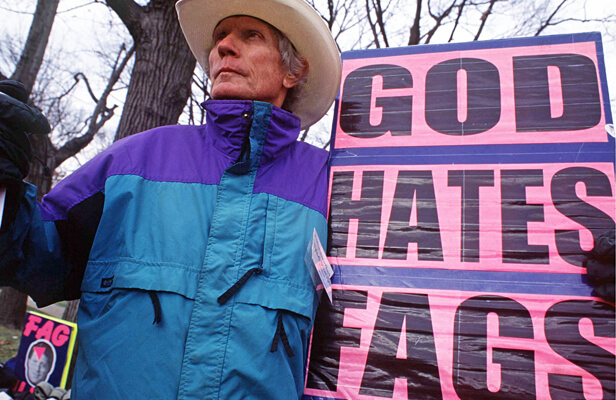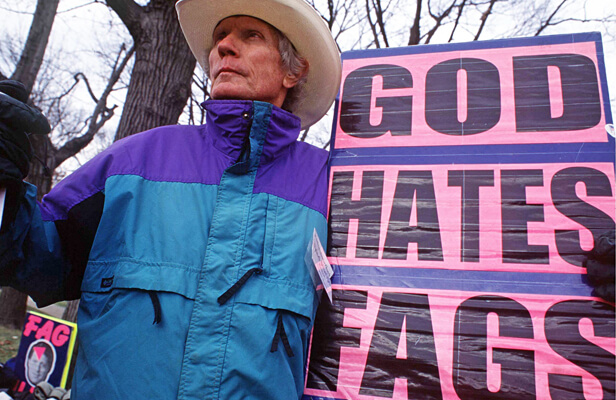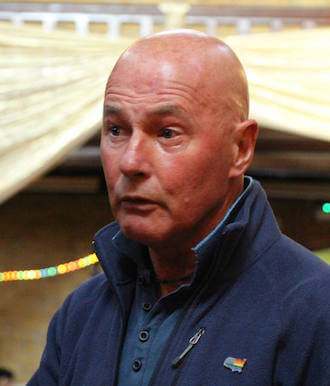Fred Phelps has died at age 84.
Many people first learned of the Reverend Fred Phelps in late 1998 in connection with the funeral of Matthew Shepard, the gay college student brutally slain in a Laramie, Wyoming hate crime –– though Phelps had been up to no good long before that.
When Shepard’s family announced plans for his October 16 funeral in Casper, Wyoming, his hometown, Phelps warned that he would be there, along with his congregation, the Westboro (Kansas) Baptist Church, to picket because Matthew was gay. The church’s online home is at GodHateFags.com, a phrase its members routinely write on posters they carry while picketing, so Phelps’ warning to the Shepard family suggested far worse than simple garden-variety ugliness.
One small miracle that occurred the day Matthew was laid to rest was that friends who loved him dressed up in white robes and wore huge white wings and encircled the Westboro crowd as if a group of angels. An event that was doubly horrible was, in that way, transformed into a moment of grace.
Observers who were more attentive than average had taken note of Phelps’ hatemongering years before he sprung into the national consciousness in Wyoming. As journalist Donna Minkowitz recalled in POZ magazine in 1994, Phelps had picketed the 1993 March on Washington for Lesbian and Gay Rights with signs reading not only “God Hates Fags,” but also “Fags Are Worthy of Death” and “Filthy AIDS Spreaders.” Minkowitz reported that Phelps and the Westboro crowd –– which usually included few people beyond his large extended family –– had been making a particular habit of picketing the funerals of famous people who had died of AIDS, including composer Kevin Oldham in 1993 and journalist Randy Shilts in 1994.
But Phelps, during those years, also took aim at college gay conferences and even a campus appearance by Maya Angelou, the poet who had read her work at Bill Clinton’s 1993 inauguration.
In the years after his notoriety in Wyoming, Phelps expanded the range of his protests to include anyone he viewed as enabling the acceptance of gays in society. In December 1998, he picketed the funeral of former Senator Albert Gore, Sr., whose son was then vice president. Post-9/11, his church threatened a protest outside the New York Fire Department’s Brooklyn headquarters, charging that the World Trade Center attacks were caused by the city’s embrace of its gay community.
But it was when the Westboro crowd began picketing the funerals of service members killed in Iraq and Afghanistan that Phelps drew the ire even of those on the right in America.
(Editor's note: On March 20, one day after this was post went up online, Fred Phelps' death was announced.)
Word is that Phelps, who is 84, is now in hospice care and near death, a year or so after being excommunicated by his Westboro congregation –– for reasons that, not surprisingly, remain obscure. Some gay activists have talked about picketing his funeral, and a bizarre tweet suggested that his daughter, Margie Phelps, who remains a Westboro member, was also calling for a protest at her estranged father’s service. That tweet was apparently a hoax, and the younger Phelps told the Huffington Post that her congregation does not hold memorial services for the dead.
For me, all of this recalls a conversation I had with Phelps a year or so after his outrage in Casper. He was threatening to lead his congregation in a picket of a lesbian weekend in Provincetown (something he didn’t follow through on, as was often the case with his threats), and one evening I picked up the phone and called his church in Kansas, expecting to leave a message that would never be returned.
To my surprise, Phelps himself answered the phone and we engaged in conversation –– for the most part startlingly civil –– for probably 20 minutes, as I challenged him to justify the pain he wreaked on the survivors of those whose funerals he disrupted. Finally, Phelps made an offer that seemed too good to be true –– he would set aside money so that I could lead a group of activists in a picket of his funeral.
Attractive as that sounded at the time, I nevertheless felt he had missed my point. For all the disrespect he had shown Shepard and others who had died, his true crime was against their families and other loved ones. I told him if he were serious in his offer, he would pay for me and others to picket his mother’s funeral. The civility immediately broke down. He told me he now realized I was nothing but “street trash,” and he quickly hung up on me.
His hanging up did not, in my view, release Phelps from his promise regarding his own funeral, but I am now doing so. No matter how depraved the man and his loved ones are, I could never bring myself to dance on his or anyone else’s grave.
And I can’t see how any LGBT folks doing so would win us friends. Phelps, for all the attention his antics won him, has always been a marginal character. On balance, he has probably helped the gay community by making explicit the hatred that underlies homophobia, no matter how much it might be dressed up by our more sophisticated opponents.
Fred Phelps has richly earned the obscurity that will be his legacy. There’s no sense in helping to keep alive his memory.




































